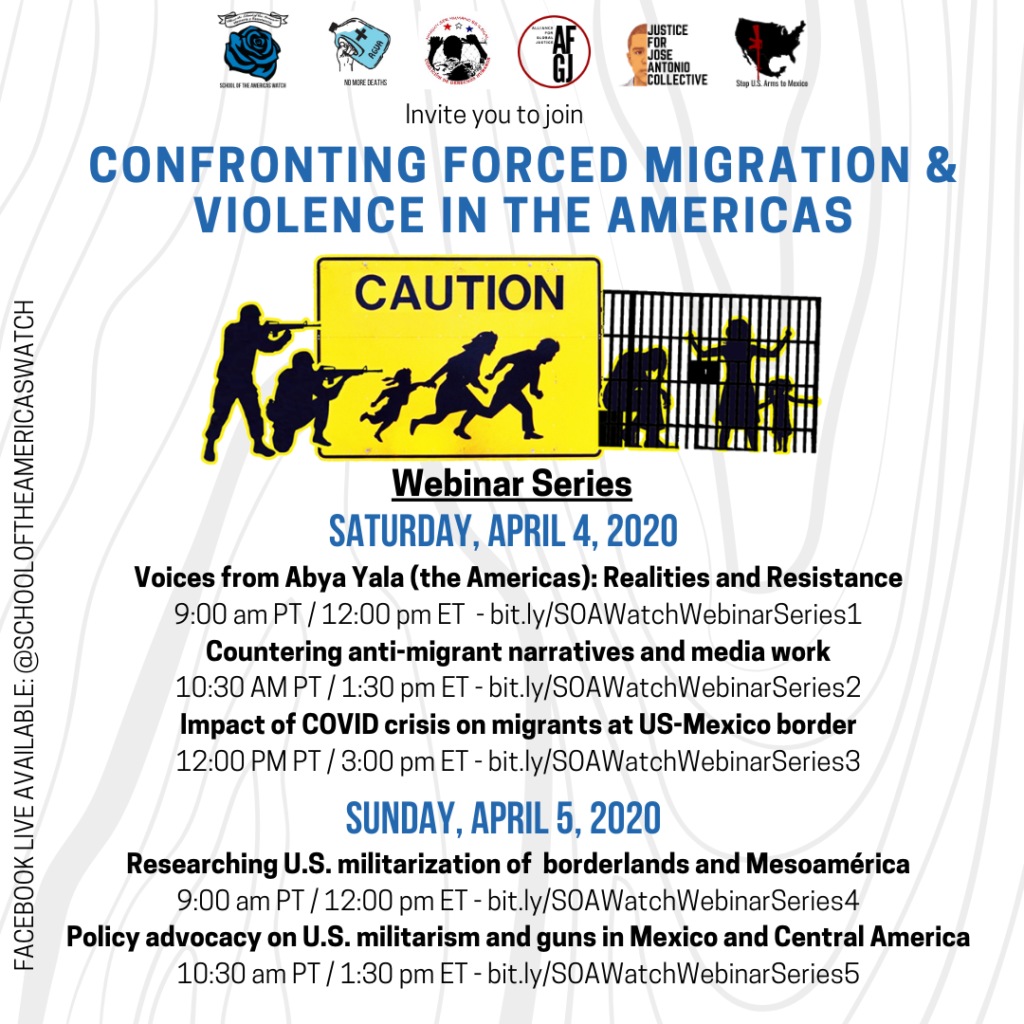We’re excited to share the recordings of the Confronting Forced Migration and Violence in the Americas Webinar Series from Saturday and Sunday, April 4th and 5th, 2020. During the series, we heard from community organizers, friends and allies about the impacts of US-backed state violence in the Hemisphere, the root causes of forced migration, and how we can using effective narratives, mutual aid, research, and lobbying to nourish our collective work as we face the current humanitarian crisis.
Lucia Ixchiu, of Somos Abya Yala – Somos Una America, laid out the “complex realities of displacement in Guatemala as a result of extractivism and neoliberalism implemented through a pattern of actions of colonialism, liberal reform, military dictatorships, processes of war, and multiple acts of genocide that resulted in Peace Accords and opened the door to a brutal process of extractivisim and displacment thorugh mining, drug trafficing, and other complex realities.” She points out the concerning reality that only 21.2% of the national population of Guatemala has access to water — a fundamental right, necessary to guarantee the overall health and wellbeing of communities, and making hygiene requirements virtually impossible to meet during this global pandemic.
Nicol Bowles, community organizer in the Texas Borderlands, shared some of the complexities of border imperialism and militarization– the dehumanizing and dangerous impacts on asylum seekers and displaced communities, and also how “family communities on the other side of the [border] have to carry the load that the neglect of the US government puts asylum seekers through”. She challenges us to “to think of how to support our neighboring communities as well, not just humanitarian aid efforts because…we can’t have one succeed without the other”.
Saturday, April 4, 2020
Voices from Abya Yala (the Americas): Realities and Resistance
Panel held in Spanish with English interpretation.
Panelists:
Lucia Ixchiu, Somos Abya Yala – Somos una América, Guatemala
Jorge Andrés Forero-González, Somos Abya Yala – Somos una América, Colombia
Abilio Peña, Servicio Internacional Cristiano de Solidaridad con los Pueblos de América Latina «Óscar Romero» (SICSAL)
Description:
In the Kuna people’s language, Abya Yala means “mature land,” “living land,” or “blossoming land” and refers to America. In the first panel, organizers from Guatemala and Colombia reflect on the impacts of neoliberalisms, extractivism, state violence, forced migration, and the pandemic within their communities and throughout the Americas. We will also discuss how communities and social movements are resisting and organizing to safeguard their rights, dignity, and territories in this context.
Countering Anti-Migrant Narratives and Media Work
Panel held in English with Spanish interpretation.
Panelists:
Maha Hilal, Justice for Muslims Collective
Laura Carlsen, Americas Program
Description:
Panelists will discuss how narratives are used to both highlight and conceal the nuances of forced migration and US interventionism. We will also discuss the role of the media in creating narratives that criminalize and dehumanize communities of color and the emergence of new narratives developed by migrants and asylum seekers.
Impact of COVID-19 Crisis on Migrants at US-Mexico Border
Panel held in English with Spanish interpretation.
Panelists:
Nicol Bowles, Community organizer in Texas Borderlands
Juan Ortiz, Casa Carmelita
Description:
The coronavirus has grabbed headlines in local and international media. However, we have heard little about the disproportionate impact of this pandemic on the most vulnerable communities. In this webinar, we will discuss the situation facing asylum seekers on the US-Mexico border and how local communities are responding to these challenges.
Sunday, April 5, 2020
Researching U.S. Militarization of Borderlands and Mesoamérica
Panel held in English with Spanish interpretation.
Panelists:
Christina Arabia, Security Assistance Monitor
John Lindsay-Poland, Stop US Arms to Mexico Project of Global Exchange
Description:
How do we access information on the US gun trade, Mexican military forces, and how they impact human rights violations? How can we translate hard data on militarism for social media use and to change policy? In this webinar, veteran researchers guide us through how to access information on US-sourced weapons in Mexico and Central America.
Policy advocacy on U.S. militarism and guns in Mexico and Central America
Panel held in English with Spanish interpretation.
Panelists:
Dana Frank, Professor of History emerita at the University of California at Santa Cruz
Eugenio Weigend, Center for American Progress
Description:
This webinar draws on the extensive experience of two effective policy advocates regarding gun policy and US policy in Honduras to respond to the following questions: What policies impact violence and arms trafficking in Mexico and Central America? Are the gun industry and militarists using the current crisis to promote harmful policies? How can we engage legislators in Washington to change those policies?
In the midst of the global COVID-19 pandemic, we are committed to organizing virtual spaces and opportunities to learn, strategize, and organize together with compas, allies, and friends throughout the Hemisphere as we seek to dismantle the structures disproportionately savaging communities of color, rural communities, working class communities, people deprived of their liberty, and so many others. We must remain vigilant to state violence and authoritarianism as governments protect corporate interests at the expense of peoples’ wellbeing and health.
Thank you for being part of the SOA Watch community and for supporting our work for justice and structural change! We could not do this work without you — if you have the means, please continue to support our work to demand accountability for US-led and backed state violence and to work in solidarity with our communities to defend autonomy and dignity of life and land.


